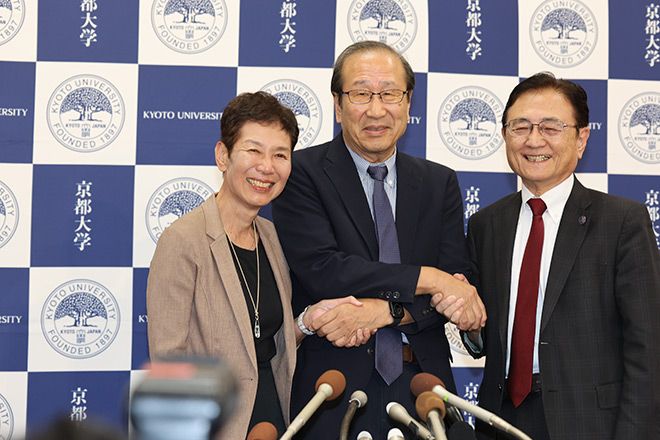“There is a sweet little horror story that is only two sentences long.”
With that tantalizing preface, the legendary American master of science fiction miniatures Fredric Brown (1906–1972) introduces “Knock,” one of his most celebrated works.
It begins, with chilling economy: “The last man on Earth sat alone in a room. There was a knock on the door … .”
Brown’s haunting imagination once lit a spark in a young Japanese boy who would grow up to win a Nobel Prize. Susumu Kitagawa, now a distinguished professor at the Kyoto University Institute for Advanced Study (KUIAS) and a newly named Nobel laureate in chemistry, traces his passion for science back to his junior high school years.
The catalyst for his lifelong scientific journey, he recalls, was reading Brown’s science fiction after noticing a classmate deeply engrossed in one of the stories. One tale featured a man who earnestly claimed to be a Martian. Another described stars in the night sky suddenly veering off course.
Brown’s worlds, brimming with endless “whys,” ignited the curiosity of a young student in Kyoto and set him on a path toward discovery.
Kitagawa’s prize-winning achievement lies in the development of metal-organic frameworks, which are highly porous and tunable crystalline materials composed of metal ions or clusters connected by organic linkers. This work may one day make it possible to produce fuel from gases, such as air.
Could it end resource conflicts around the world? Might it help halt global warming? This is research infused with a sense of genuine wonder.
The journey to this breakthrough was far from smooth. There were times when his work went unrecognized, its value overlooked. Yet at the news conference on Oct. 8, following the announcement of his Nobel Prize, he spoke with warmth and wit, never lingering on past hardships.
“Gases (‘kitai’) are drawing ever more kitai—expectations,” he quipped, playing on the double meaning of the word with characteristic charm.
To young scientists, his message was clear: “Luck favors the prepared mind.”
Quoting Louis Pasteur (1822–1895), the renowned French chemist and microbiologist, Kitagawa invoked a legacy of curiosity and rigor. And surely, he knows another of Pasteur’s enduring insights: “Let me tell you the secret that led me to my goal. My strength lies solely in my tenacity.”
—The Asahi Shimbun, Oct. 10
* * *
Vox Populi, Vox Dei is a popular daily column that takes up a wide range of topics, including culture, arts and social trends and developments. Written by veteran Asahi Shimbun writers, the column provides useful perspectives on and insights into contemporary Japan and its culture.


AloJapan.com